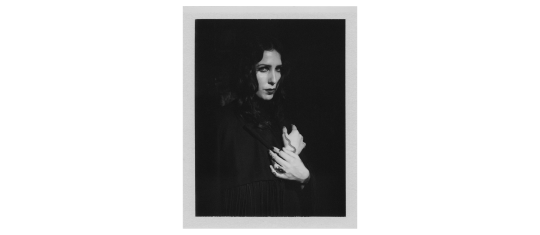
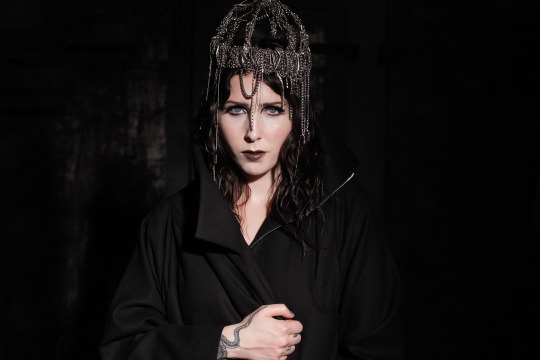

From her modest roots in Northern California, songwriter and vocalist Chelsea Wolfe has emerged as one of the most intriguing musicians in the post-label digital music era. After laboring in an office job and learning her craft in art houses she came to public attention with the album Apokalypsis roughly five years ago. With each new release her public profile has grown. At the same time, Wolfe continues to stretch both creative and musical boundaries. Her music – crafted from stories that Wolfe finds via voracious reading – contains elements of electronica, metal, folk and industrial. While it touches many different genres her music is instantly identifiable and completely her own. Wolfe recently released Abyss and is in the midst of a touring circuit to promote the album. She talked to us about her voice, what beauty means to her and isolation.
NERO: We’re conducting this interview via an e-mail. You’ve done interviews on camera before—albeit not frequently – but do you find this method of communicating easier?
CHELSEA WOLFE: Honestly, it depends on the interviewer. Some are really good at pulling things out of you, but some expect you to provide them with a bunch of stories and rhetoric out of nowhere - basically they want you to do their job for them. Those are always the worst interviews because I’m not naturally a great public speaker, but I’ll definitely sit down and have a good conversation with someone if they’re willing and have interesting questions.
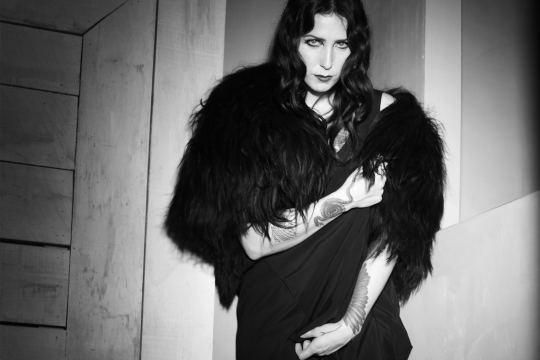
See the full interview and photoset at Nero Journal
NJ: Did you enjoy your childhood in the Sacramento area, or did you always want to get away? Do you visit home often?
CW: My childhood there consists of different eras, really. The era I remember most was living in an area of town called Old Roseville with my grandmother in this big, old house covered in ivy vines, with a murky pool in the backyard like a pond. It was next to a railroad museum, across from the train tracks. I loved the sound of the trains; that constant forward-motion. We’d build our own model trains and towns out of small boxes and paint. My grandmother taught me about aromatherapy and would practice reiki on me - she taught me about energies and different realms. My mom was always an artistic person as well, and then at my dad’s house there was always music and movies. I wanted to get away when I was younger, but also always enjoy going back to Northern California. It’s truly my home.
NJ: What music grabbed you when you were a child?
CW: The first voice I remember falling in love with was Lindsey Buckingham from Fleetwood Mac. My dad’s country band would cover Fleetwood Mac songs from time to time and I got into them. When I was a bit older I heard Lauryn Hill on the radio with the Fugees and was so into her voice. I loved Aaliyah, Joni Mitchell, Johnny Cash and Black Sabbath.
NJ: When you took your hiatus from writing music in your early 20s what were you doing? Was it difficult to walk away from music?
CW: I was just a bit lost at the time, working in an office building, trying to figure out what to do with myself. I’d made an album in 2006 that I wasn’t happy with. It felt over-produced, overly lyrical and overly personal. I knew I wanted to keep making music but also knew that that album wasn’t quite right, so that’s when I stepped back from music for a minute.
I eventually started writing again, recording songs in my bedroom. Around that time I was hanging out a lot with my good friend Steve Vanoni (a great painter and performance artist) at his art compound HorseCow. He invited me to come along on a performance art tour he was doing in Europe, to be the resident musician. So I quit the office job and went on this tour, playing a few songs at the end of each night. That was the way I found my voice again: hearing it in different situations and spaces, and learning from the freedom of the performance artists I was with.
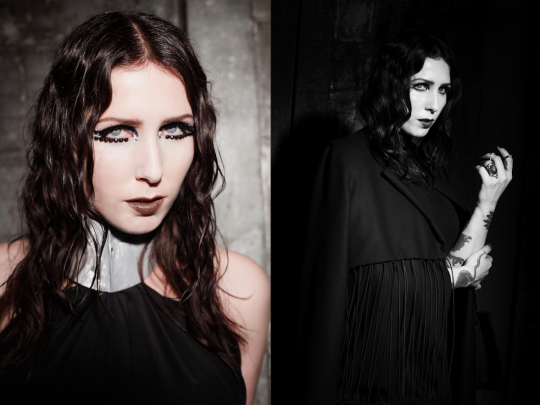
NJ: One of the striking things about your music is how you maintain this wonderful balance between beauty (often embodied by your voice) with something dissonant and discordant. Do you think of beauty as an ideal or something that can only exist in opposition to other things? Do you think this dynamic was especially present on Abyss?
CW: I’ve always had some kind of affinity towards contrasts, macro vs. micro, since I was a kid. I even had recurring nightmares that reflected it. I can’t only imagine one side; I see the physical and the spiritual, the beautiful and the ugly. I acknowledge that for every lovely thing in the world there is something just as dreadful happening at the same time. I’m not trying to be grim, just realistic. I create music as escapism at times, but more often than not it’s just an expression of reality.
NJ: When you aren’t working on music or on the road do you enjoy time alone or isolation? What does being alone mean for you and what do you do?
CW: I move in extremes. Tour is so full of people, places, experiences, that when I get home I need the opposite - I need a quiet place to process it all and write. I’m one of those people that get really affected by other people’s energy. Honestly, I can be a bit of a wild animal when someone fucks with me - I don’t take it well, but I also don’t want to be known as someone not able to control my rage, so instead I withdraw. I moved out of Los Angeles into the mountains when I started writing my last album Abyss, and I plan to move further out soon.
NJ: When do your best musical ideas come to you? Is there a place or a routine involved? Or do they just come in their own time?
CW: They come along when they want, usually unexpected. In the past I used to stress over the dry months, when I wasn’t feeling inspired and wasn’t writing much - I’d think that I’d never write again. But now I see the pattern, and I know that the next wave is coming in its own time. Sometimes I’ll have writing sessions though, like I’ll set up a makeshift studio in a new space and see what comes. I did that for Abyss out at my manager’s big, empty barn. It was a great place to write.
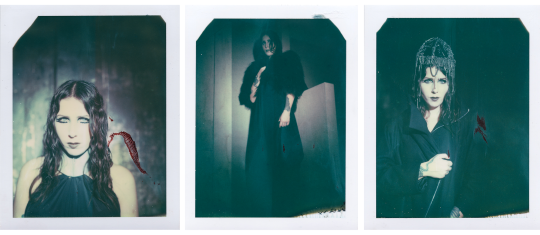
NJ: How would you describe your voice to a stranger?
CW: When I was younger I thought you had to have a really technically amazing voice or musical skills to be a professional musician. It held me back for a long time. Then I realized that a lot of the artists I was into weren’t professionally trained, or maybe weren’t the “best” singers, but there was something about their voice and songwriting that people were drawn to – like Neil Young. So I thought, well, my voice is weird, but maybe some people will find something in it they like. My favorite art has always been folk art, outsider art. And that’s where I stand as well.
N: I’m wondering if there is a particularly fertile ground you mine for material for songs– do you read certain things or watch certain programs or do you just take in things as you see or hear about them?
CW: I write tributes to people, really. I had read some stuff by this poet Xu Lizhi who worked at that massive Foxconn factory in China - he killed himself because he felt so trapped there. His words and his story really moved me so I tried to imagine what his surroundings were like, the suffocating walls and assembly lines. Then I imagined that when he died his spirit was dancing around the factory, and then leaving, finally free. That became “Iron Moon.” And I wrote a song about the tsunami that happened in Japan a few years ago after watching a documentary about it with a lot of home video footage.
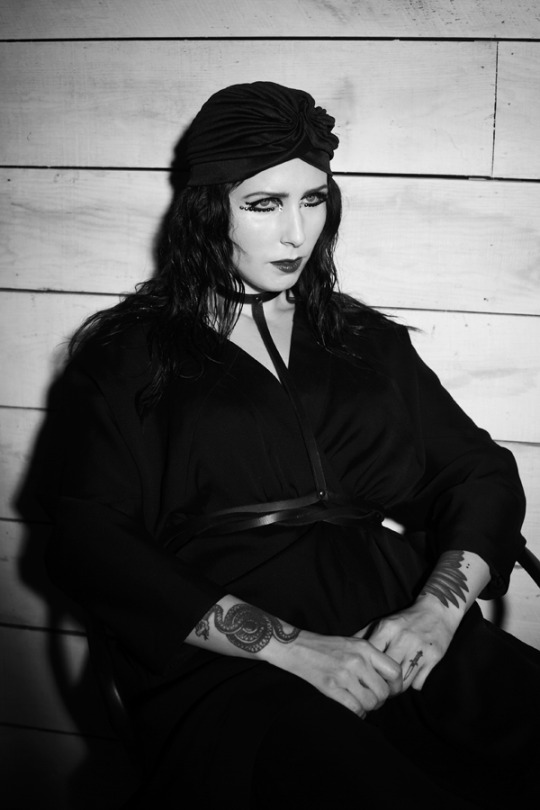
NJ: You’ve talked about your stage fright in the past but also mentioned that you are largely over it. What was the process like to overcome it, or was it just a case of getting accustomed to it after playing live?
CW: I’m over it in the way that I realized at a point that if I want to take this shit seriously and continue on as a musician, and if I wanted to really make a connection with people, I needed to get over my shyness and put myself out there, even when it was uncomfortable. I’m not naturally someone who wants to be the center of attention, but I’m also a tall freak who makes dramatic music so those things will always be at odds with each other.
At first I tried to disappear, wearing head to toe black, even covering my face with a veil in the style of Victorian widows in mourning - I felt it was a barrier between the audience and I, and it helped me through my earlier shows. When Apokalypsis came out, it was time to move forward from that. One of the meanings of that Greek word is “lifting of the veil,” so it was also symbolic. I played a show in New York at St. Vitus and removed the veil onstage, mid-set. Now I just try to dress in a way that makes me feel confident and I approach getting ready for a show as a sort of ritual. You have to pull yourself together in order to fall apart onstage. I always try to lose myself into the songs - that’s the best way to forget you’re in front of an audience while still giving them, and yourself, a genuine experience.
NJ: From the beginning of your career – I’m thinking of the cover of Apokalypsis – you’ve had a very distinct style and way of presenting yourself. How did you discover that or did the music in some ways dictate it?
CW: I mean, the music dictates it yes, as you’re trying to tell a story that relates the images to the music. I’ve also just experimented a lot over the years with my photographer friends. I was a sort of test dummy for my friend Kristin Cofer as we were both learning and growing as artists. I like working with friends as I can open up more and feel like I can be myself. The cover of Apokalypsis was a self-portrait that I sent to my friend Christopher Orr of the band Screature to paint on. He whited out my eyes, which represented the moment of epiphany or realization - that’s what that album was about.
For Abyss, artist Henrik Uldaalen reached out to me a year before, offering to do artwork for me if I ever needed. When it came time to choose something for the album my manager reminded me of his work and it was just so perfect, as most of the subjects he paints are floating in white space or some kind of darkness.
NJ: When you leave home and go on tour what are some things outside of the obvious like instruments that you always pack?
CW: I’ll bring a book – for this tour I have a book called The Soul of an Octopus (by Sy Montgomery). And I’ll bring a few pieces of jewelry and handmade clothes that are like talismans; good luck charms to help me feel confident for the shows. I had most of my stuff stolen on my last US tour, in Portland, so I had to start over a bit. Now I’m more minimal with what I bring along. People who steal personal things like that are the worst. My Dad was working construction for a few years when I was a kid and once his van got broken into and all his tools stolen. I remember thinking, they didn’t just steal material things, they stole his livelihood; they stole the way he can find work and provide for his family. That’s much worse that stealing from a big corporate store.
